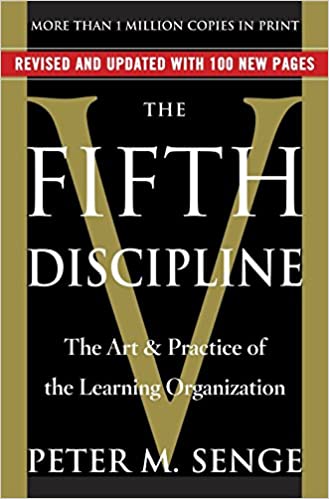The Fifth Discipline — Book Summary
Introduction
In this book, Peter Senge shares life lasting knowledge to help the developing and learning professional prosper across industries and even generations. Over the course of his in-depth explanation of the most crucial thought processes necessary for success, he outlines a great road for you to improve yourself and those around you.
Through a careful analysis, we can extract the best tips for the future of you and your business dealings to help you achieve the seemingly elusive American dream!
Interesting quotes from the book
Because we see the world in simple obvious terms, we come to believe in the simple, obvious solutions.
— Peter Senge, The Fifth Discipline
The bad leader is he who the people despise; the good leader is he who the people praise; the great leader is he who the people say, 'We did it ourselves.'
— Peter Senge, The Fifth Discipline
Through learning we re-create ourselves. Through learning we become able to do something we never were able to do. Through learning we reperceive the world and our relationship to it. Through learning we extend our capacity to create, to be part of the generative process of life.
— Peter Senge, The Fifth Discipline
Summary of the book The Fifth Discipline
"The Fifth Discipline" has many great roadmaps to help you develop and maintain a well-rounded mindset that can do nothing but benefit the future ahead. You'll catch yourself around the third chapter asking what these five disciplines are, as many of the chapters hide the best pieces of information like that a little too well. Without any further ado, let's delve into that.
THE FIVE DISCIPLINES
1. Personal Mastery
It all begins with one person. One person who causes a problem, finds a solution, or simply opens their mind a little more than the day before begins their journey to personal mastery. In several points in the book, Senge always comes back to the individual and their contributions to the whole as either building-up or breaking-down the progress of others. It begins with us and our drives. If you're not motivated with your personal life, that same lack of drive seeps into even the most driven professional. Senge outlines that we need to find that clarity and understand that learning is necessary to be better. Only this will help increase our depth of vision and help us map our way towards our ideal reality.
2. Mental Models
Soon after the beginning steps of personal mastery are in play, we realize we placed blinders on our beliefs and perspectives of the world around us. It's thanks to the learning we learned to accept as a part of our continuous and, hopefully, long lives that we can expand these things. It's an ever-changing world with ever-changing people.
3. Shared Vision
Having anywhere from three to 300 share the same commitment is a feat, but quality people will inspire similar loyalty. By having the right people in place, they can spread the wonderful tradition of vision with teamwork and improvement. Without such a spirit, this discipline makes the future seem nearly impossible if your fellow teammates can only inspire nonconstructive criticism and low morale.
4. Team Learning
Recognizing that everyone comes from different backgrounds, skills and cultures can help plan an appropriate course of action and effectiveness of a team unit. The individual and the team need similar or different trainings in certain contexts. When we train the person for what they need to improve on, instead of wasting the time of other team members, morale is kept up as they don't feel like they're being treated like children. We train the team when the entire team needs a refresher or even a new foundation to build on, keeping them happy and motivated instead of irritated and dreading the day ahead.
5. Systems Thinking
This is the crowning discipline of the book. It's the ability to see systems and processes in practice and analyzing effectively. Being able to quickly assess these changes in power and/or importance not only in the mechanics of humans but also our choices of "robotic" thinking. When you can think systematically, you can organize, analyze and fix problems much more easily.
Unfortunately, there's no certification of completion for achieving these goals. They are what we need to strive for every day, as life and work is a process in which is never truly successful until we are able to rest. You can fail one day and succeed the next, and if you got a trophy for it, it would need to be revoked and reinstated very often if you needed a physical representation of it. The better representation of putting these into practice is analyzing your team and yourself by answering a few questions.
- Do you take the easy way out rather than investigating?
- Do your coworkers avoid bringing problems to your attention?
- Does your team focus on the good or the bad?
- Is there laughter or light in the eyes of your team members?
At this point, you would think you've gathered all the information from the dense book. Unfortunately, with every good to put onto your goal list, there are also disabilities you need to target for improvement. And thus, the next portion of the summary is a simple outline of what may be holding you back from improving yourself and your surroundings. In two sentences or less, let's identify and briefly explain exactly what each of these supposed disabilities Senge talks about.
THE SEVEN LEARNING DISABILITIES
1. "I am my position"
This refers simply to the belief that nothing can change for the better or worse.
2. "The enemy is out there"
This one is a lovely double-meaning; the enemy is outside and never within.
3. The illusion is taking charge
Believing does not equal true results. Humans typically see what they want to see versus what is actually in front of our eyes.
4. The fixation on events
The event either sours or sweetens our personalities and changes our perspective very quickly. The attitude we put on like a sweater is just as infectious in our surroundings as a yawn at the 8:00 AM meeting: everyone is immediately drowsy for the rest of the day.
5. The parable of the boiled frog
Simply put, if things are immediately distasteful it is obviously in need of a change. However, if it gradually becomes worse, most people will just accept it as the normal and simply live with the unnoticed problem.
6. The delusion of learning from experience
Not everyone will learn from the experience they lived through, but they will often claim so.
7. The myth of the management team
Management professionals are seen as cool under pressure with extremely honed problem-solving skills mixed with a dash of risk taking. In the real world, this is hardly the case as they are more worried with keeping power and avoiding any personal blame making little use of their position or power.
Key lessons from the book The Five Disciplines
Though Peter Senge makes it clear these goals are something to strive for as often as possible, there are some additional lessons hidden in the book that will be useful to put pen to paper.
Lesson 1: Team Fulfillment
The first message that really strikes home is that people want to be included in a team. Not simply contribute or be on the sidelines but being a pillar among pillars that keep the team effective and fulfilling for all. Many managers and self-proclaimed leaders claim to make this culture effective, but all too often their claims are false. It is up to everyone to continue to learn to improve the situation they find themselves in. Though it's the fault of another, we can have a hand in changing for the better. To recreate our perspectives through new information after being absorbed and then practiced is the bare essence of life and is the foundation for the book.
Lesson 2: Superficial Support
So often we look for whatever support we can muster from our surroundings instead of true support. By building a more meaningful connection with coworkers and superiors, they will offer more meaningful backup in a time of need. Otherwise, these false promises will simply be needles to fall on instead of a cushion.
Lesson 3: Standing for Change
No one truly wants to be the first to do something difficult. Building this type of bravery to impact your professional career is difficult, but the results will be more than worth the sacrifice. If there's something you can change, do your best to achieve it little by little and improve those around you while you can.
Review of the book The Fifth Discipline
I first read this book just after high school as I prepped for college. Of course, my idea of college was shaped by teachers who made it sound as if it was as complicated as any lawyer-school setting in a movie and I was intent to fitting in. 'The Fifth Discipline' was recommended by a mentor of mine, and most of the information slipped past me. It was written in a tone that was difficult to soak in, making me feel as if I shouldn't read it for a few years for it to really make a difference. I read it again a few years later, and I could finally relate better to the context. While it provided many points of reflection even at a young age, it is more suitable for entry-level adults with a few months of experience in real life scenarios instead of relying on movies and media for context. Overall, it is worth the purchase and keeping it around for general browsing during difficult times. But after you've read this summary, you may find the book longwinded with such a simple explanation at your fingertips!
Conclusion
Peter Senge is a very professional writer, which is not an ideal tone for most readers. However, the wisdom he can pass on, while difficult to consume, is well worth the read. Instead of being preachy and unrelatable in his success, he's able to articulate goals every developing and improving professional should strive in their arsenal. By improving yourself you can improve the world around you, however small. With an emphasis on the individual and their role in their surroundings, 'The Fifth Discipline' comes across as one of the most needed texts on your bookshelf.
Don't miss the other book summaries on SunInMe.org

